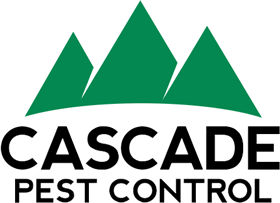Author: Kurt Treftz, Cascade Pest Control
A growing problem around the world for both farmers and residential landowners is a phenomenon known as pest resistance. Over 600 specific pests can be said to have developed some resistance to commonly used pesticides. So what is pest resistance, how does it occur, and what can we do about it?
Pest Resistance: What is it?
Simply put, pest resistance is when a population of pests is no longer sensitive to a particular pesticide used to control it.
This means that the pesticide you are using will no longer kill/prevent the pest that you are targeting. As pests become more resistant to the products we have to prevent them, problems develop that we can’t stop.
Pest Resistance: How does it happen?
When we think of a pest becoming resistant, we often think that a particular individual that is not susceptible has mutated or changed. However, it is not the individual weed, insect, or microorganism that causes concern, but the whole population.
Whenever a pesticide is used, there is a tiny proportion of the pests that survive their exposure. This is usually a genetic trait and it is often passed down to their off-spring. Now, in the next generation, you have a few more that are resistant to that pesticide. If you continue to use that same type of pest killer, you will have fewer pests killed the next year. Then those pests breed more pests that are able to resist that application. So, the next year there are more pests with that resistance, and the next year, and the next year. . . until the proportion of less-susceptible individuals will increase.
Over time, that pesticide will not control the population. When that happens the population is said to be resistant.
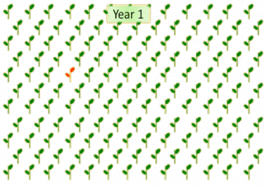
|
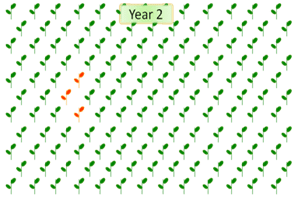
|
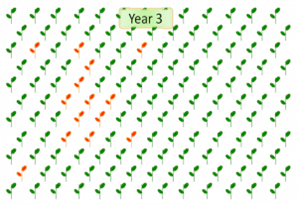
|
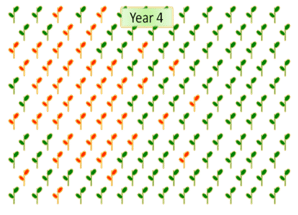
|
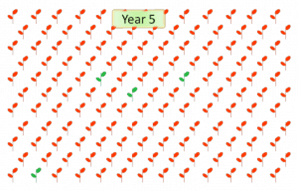
|
Pest Resistance: What can we do about it?
Since this is a growing concern around the world, we need to ask what steps we can take to prevent widespread resistance from developing.
A three-fold strategy for combating pest resistance is avoid, delay, and reverse.
Avoidance: Whenever and for as long as possible, don’t use chemical pesticides.
- Plant pest-resistance crops that can naturally repel or fight pests.
- Nourish healthy plants with proper fertilization, irrigation, etc which create strong strains to resist pests.
- Rotate different crops that resist different pests.
- Control weeds with physical removal, tillage, or even grazing animals where possible
Delay: When pesticide use is warranted, keep in mind the following.
- Use pesticide only when needed
- Use pesticide only when pests are at their most susceptible
- Use pesticide from different chemical classes with different modes of action and rotate their use to reduce the number of resistant pests each season/generation
Reversal: Some resistance is reversible.
- Minimize pesticide use as mentioned above
- Allow time between applications. This can cause the population to be naturally diluted by susceptible pests once again.
- Avoid “tank mixes”. This is when you apply multiple types of pesticides in an attempt to eradicate all the pests. Instead this can create a situation where you create super pests, resistant to multiple types of pesticides.
- Don’t use persistent pesticides. An ideal pesticide should quickly disappear so that it doesn’t create a “selecting dose” where its concentration helps select those resistant pests and causes them to be the ones to pass on their genes. Pesticide use should be targeted. It should be timed to be effective at particular stages, but not prolonged to create resistance.
Being aware of pest resistance is important for everyone! Being responsible with pesticide use is critical in reducing resistance pests. Trust the experts at Cascade Pest Control for all your pesticide needs. They are leaders in environmental-conscious pest management. Call today: 888-989-8979
